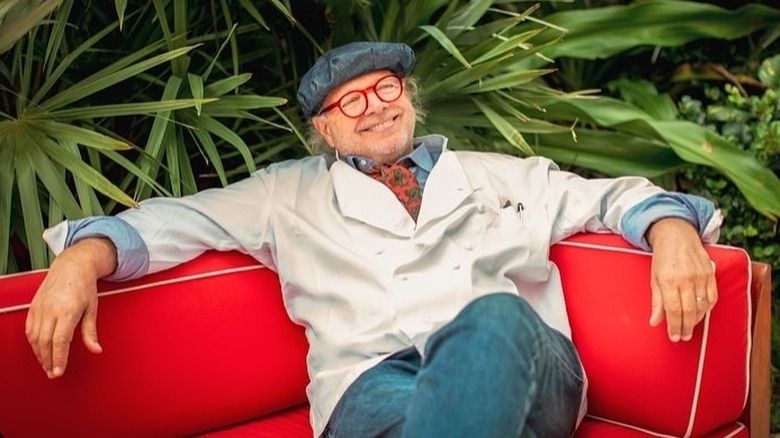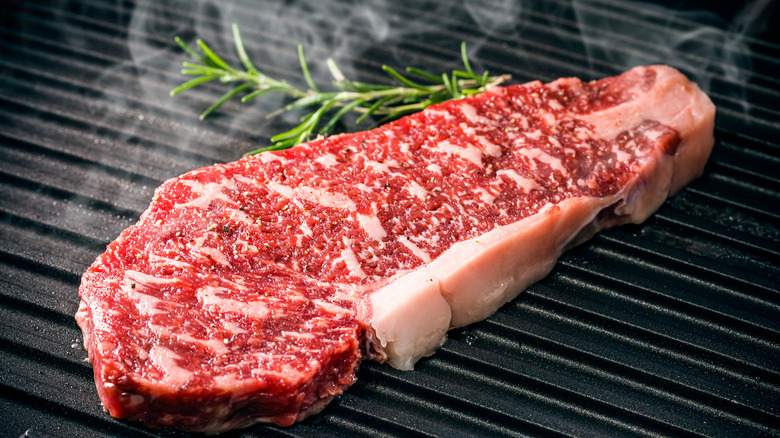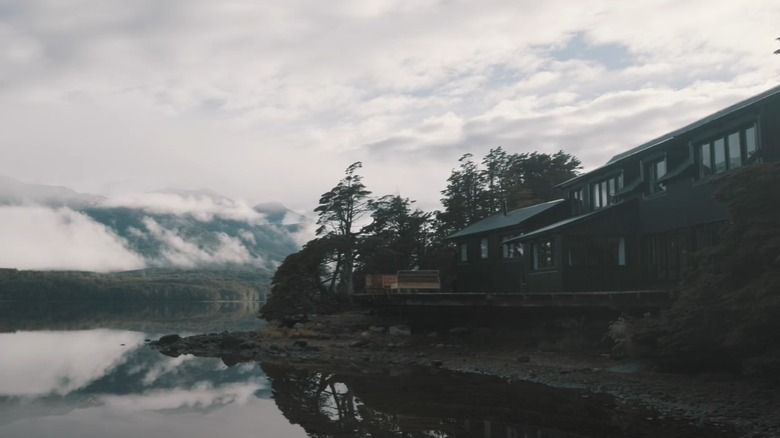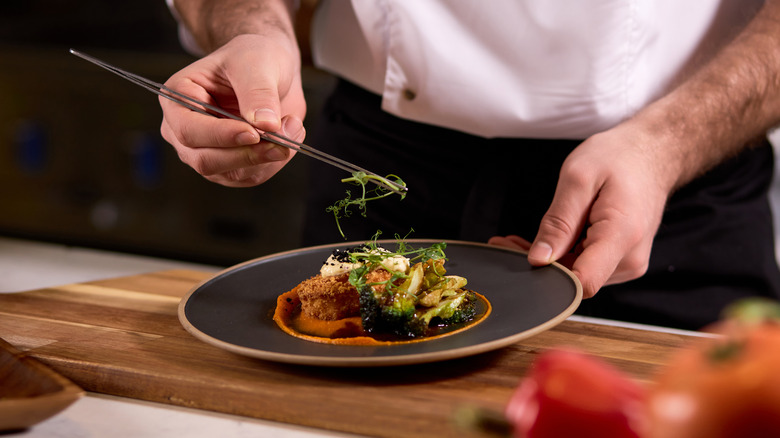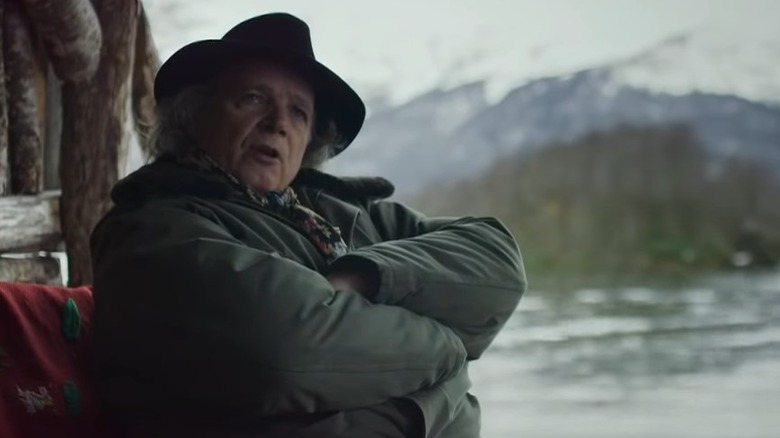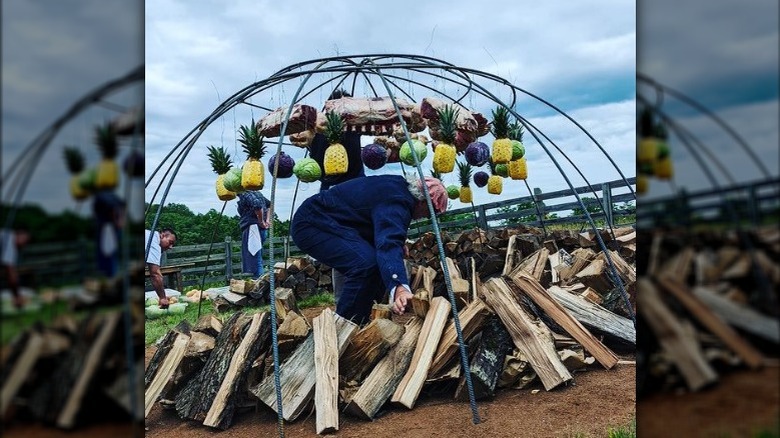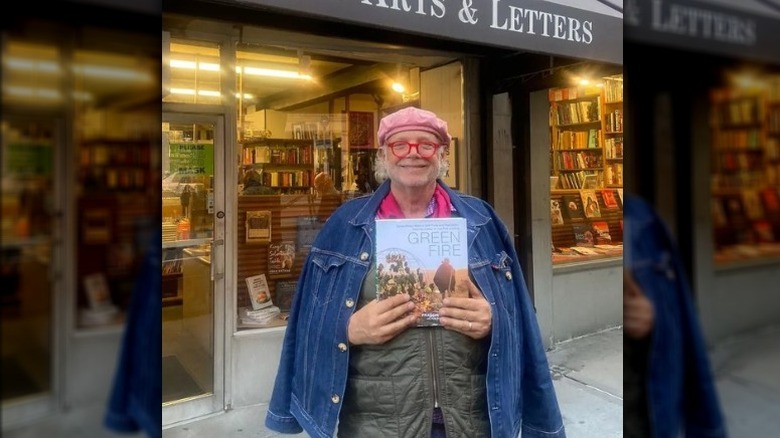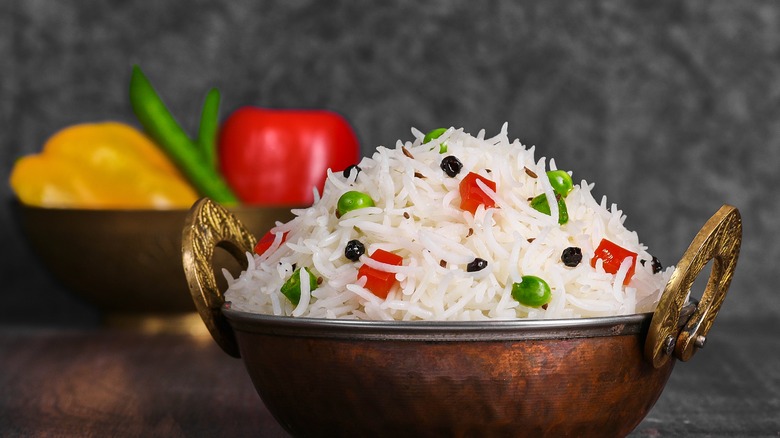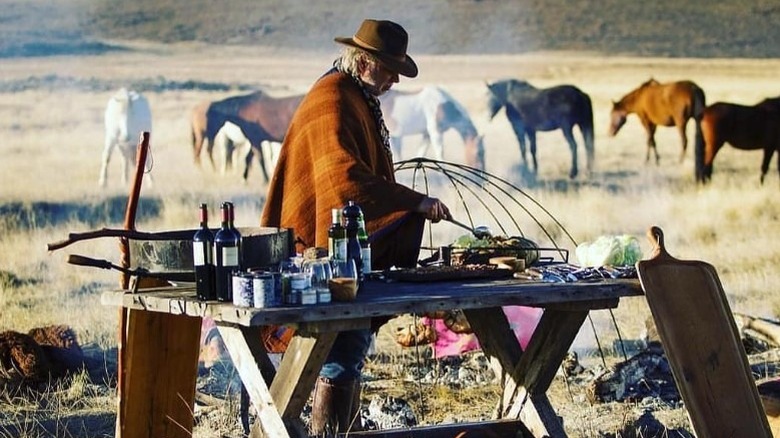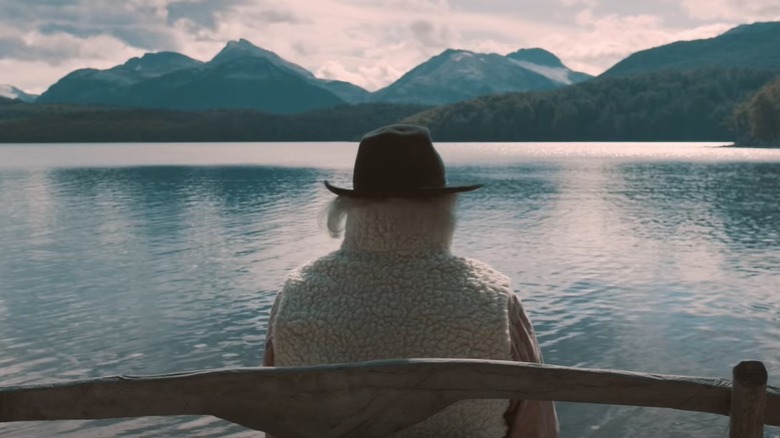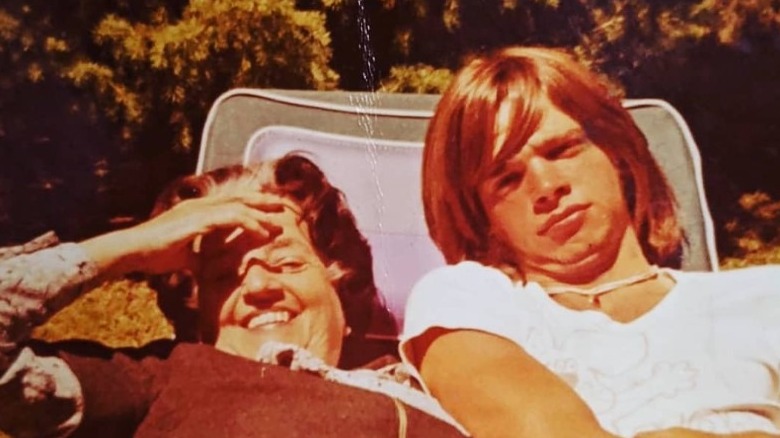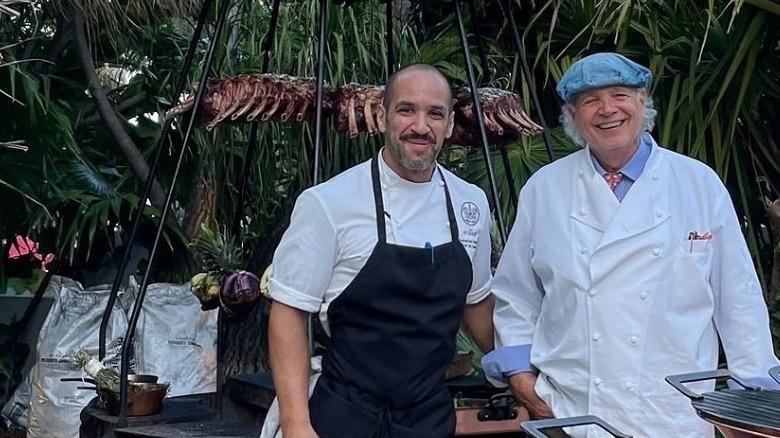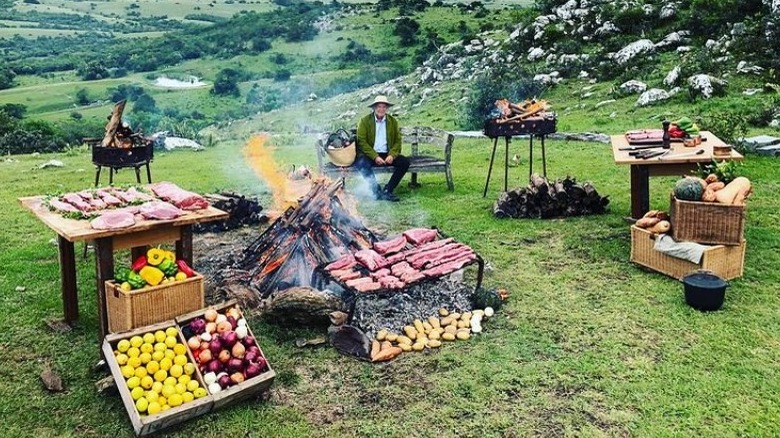The Untold Truth Of Francis Mallmann
We may receive a commission on purchases made from links.
When you think of a chef, you might envision a prim and proper toque-wearing perfectionist who runs a kitchen with a strict attitude. You also might picture someone with an incredibly serious demeanor or one who has an "all-work-no-play" motto when it comes to kitchen work. Well, that portrayal makes sense considering the way so many movies and television shows portray chefs. Many often show as them dictators of the kitchen who operate with an iron fist. Think Bradley Cooper in "Burnt" or Chef Skinner in "Ratatouille." However, when it comes to famed Chef Francis Mallmann, this common portrayal couldn't be farther from the truth (via Plan South America). That's what makes him so intriguing.
Mallmann runs nine restaurants throughout the world – Los Fuegos, Patagonia Sur, Fuego de Apalta, 1884 Restaurant, Garzón, Bodega Garzón, Siete Fuegos, Orégano, and Francis Mallmann at Chateau la Coste. Hailing from Argentina, he's known for his mastery of open-fire cooking techniques as much as his nomadic and bohemian lifestyle. This guy is a far cry from the white-attired chefs marching around the back of the house and yelling at everyone in the middle of chaotic dinner service. His lifestyle is truly unique, as is his attitude about food. Get your taste buds ready, folks. This is the untold truth of Chef Francis Mallmann.
He never turns a steak more than once when cooking
If you ask five different people how they cook their steaks, there's a very real possibility you'll get five totally different answers. Everyone has their own ways of cooking food, but many times the outcome is pretty much the same. The great thing about cooking is that there's rarely only one way to get something done. You can travel several different routes to arrive at the same destination. However, sometimes it pays to listen to a seasoned chef and do as he says for the optimal result. When it comes to steak, Francis Mallmann has one tip he implores us to abide by.
The trick to cooking a perfect steak, according to Mallmann, is to turn it only once during the process. For example, if you're coking a steak for ten minutes, Mallmann suggests cooking it for six minutes on the first side and then for four minutes on the other. This way it's entirely finished on the first side before you flip it. He also suggests that you treat it like something you're in love with by constantly nurturing it. He says to adjust your approach by paying attention to the steak as it cooks. So the next time you fire up a steak, treat it like someone you love and you'll end up with the perfect meal.
He owns a private island in Patagonia you can visit
If you truly want to get inside the mind of Francis Mallmann, there's just no better way than saving up some money and traveling to La Isla, his private island in Patagonia, and spending time with the man himself. Listen, it's far from cheap, but if you and five other friends can gather together $66,000, you can enjoy a six-night stay at his gorgeous pad. For a group of hardcore foodies, it would be a once-in-a-lifetime opportunity that would live in their memories forever.
One thing to keep in mind if you are actually thinking of going on the Patagonian adventure: It's kind of a pain to get to Mallmann's place. One writer for Travel + Leisure, Gisela Williams, detailed the arduous journey. She wrote, "The journey required two flights to get from New York to southern Argentina's port city of Comodoro Rivadavia, followed by a six-hour drive along empty dirt roads and, finally, a boat ride across Lago La Plata, on which I weathered the freezing temperatures in a full-body waterproof suit. By the time the speedboat pulled up to the dock of the 15-acre island, I was delirious with exhaustion, my face and toes numb from the cold."
However, when she finally arrived, she found the entire stay well worth the effort.
He believes people will eventually adopt a purely vegetarian diet
While Francis Mallmann has quite the reputation for cooking succulent cuts of meat over an open flame, recently he's actually adopted a more vegetarian outlook on life. He said of the future of food consumption, "I think that, in the next twenty years or so, no one will be eating meat or fish." Quite fascinating. Of course, no one has a crystal ball to tell them if that will actually be the case, but Mallmann has adopted a new attitude based on his opinion. It was one event in particular that changed his whole outlook.
Mallmann explained his whole change in mentality started with a cookbook he wrote. He said, "I started to receive hundreds of messages on Instagram saying, very respectfully, 'We love your work, and by the way, we are vegan. Can you make more recipes for us?' For them, I decided to write a cookbook. It's like you have a rose in a vase and it's getting old, and one of the petals falls, and you touch it and suddenly they all fall. For me, it was like that: my rose collapsed in my fingers, and my point of view has been changing ever since."
It's so interesting that a man who was so intertwined with a carnivorous way of life could turn such a corner. We'll see if his prediction about future vegetarianism is correct.
He was featured on an episode of Netflix's Chef's Table
The show "Chef's Table" on Netflix is a fantastic documentary series that highlights one chef on each episode and takes a deep dive into the passion and philosophy that drives them. In the first season of the show, one of the episodes focused on Francis Mallmann, and viewers were taken inside the mind of the open-fire master. Needless to say, Mallmann indulged the audience with some very poignant ideas on his process and the importance of developing a passion.
When discussing his philosophy behind his cooking, he said, "I am a cook that uses cooking to send this message of a way of living. I'm always cooking in remote places, in the wild, with fires. So my message is: Get out of your chair or your sofa or your office, and go out."
He also went into detail about the importance of uncertainty when it comes to a career path.
He explained, "Today I think we educate kids to be settled in the comfortable chair. You have to have your job, you have your little car, you have a place to sleep, and the dreams are dead. You don't grow on a secure path. All of us should conquer something in life, and it needs a lot of work, and it needs a lot of risk. In order to grow and to improve, you have to be there a bit at the edge of uncertainty."
He has a special passion for cooking over fire
Every chef has their own preference of how to cook. Some like using ranges, others might prefer the sous vide method. And, of course, firing up delicious food on a grill is popular. However, Francis Mallmann directs his attention to a uniquely different way of serving up delicious cuisine: open-fire cooking. Mallmann uses a bed of coals to slowly cook fruits, veggies, and meat to absolute perfection. However, when using this method, the key is taking your time. You can't rush, or the flavors won't turn out the way you want. This style of cooking is what Mallmann swears by, and he's made a lucrative career out of it.
Malmann explains how efficient his open-fire method is: "With this simple fire you could feed 12 or 16 people. You don't need a lot of space. When we do our TV shows, we try to get people to go outside. Go into the wild if you can — or just a park or the doorsteps of your own home. Walk out of the kitchen and do something different, that's the idea. The slowness is great. If you hang a very big piece of rib eye and cook for nine hours, you will get the same temperature and pinkness throughout. Chickens roasted for six or seven hours; it's incredible how crisp they are. You need to crave the romance of cooking with fire."
He's written several books about open-flame cooking
A guy like Francis Mallmann isn't one to keep his passion and methods of open-fire cooking a huge secret. No, he wants everyone who's interested to get out there and try it themselves. He wants chefs to discover just how great this unique way of making a meal is, and spread the good word to people they know so they too can discover culinary excellence. Well, luckily for anyone fascinated by Mallmann's life and cooking techniques, he's written several books that are available for purchase.
One of his books, "Slow Fires: Mastering New Ways to Braise, Roast, and Grill: A Cookbook," focuses on techniques that ensure any cut of meat you cook is flawlessly executed using factors like moisture ratios and heat intensity. But if you're looking to cook a vegetarian meal, he also published a vegetarian cookbook titled "Green Fire: Extraordinary Ways to Grill Fruits and Vegetables, From the Master of Live-Fire Cooking." Mallmann ensures people of any culinary walk of life can share his love of cooking over an open flame. And, if you want to learn about all seven cooking techniques Mallmann uses, snag yourself a copy of "Seven Fires: Grilling the Argentine Way." This is the kind of literature any foodie who's interested in expanding their culinary prowess needs on their bookshelf.
His favorite ingredient is Basmati rice
Asking a chef what their favorite ingredient is can be compared to asking a parent who their favorite child is. It's virtually impossible to give an answer. Chefs work with so many ingredients on a daily basis, and every ingredient plays a specific role in pushing the perfection of a dish forward. But, Francis Mallmann certainly has an answer when asked that question. You'd likely think it was some juicy cut of meat he loves cooking over an open flame. But that couldn't be farther from the truth. He loves his basmati rice more than anything else.
Mallmann explains how his love affair with basmati rice began: "When I was eighteen a friend of mine from Iran, who lived in Paris in those days of the late 70s, he use to take me to Iranian markets and he would make me kneel on the floor in front of the bags of rice and put my head inside the bag to understand what truest rice was. Since then my favorite meal is white rice with red cabbage salad with a very special dressing I do with many things. So I could eat that every lunch and dinner and be very happy."
It's pretty awesome knowing a man with so many layers loves such simple food.
There are four staple items on his dining room table at every meal
It would be so interesting to be a fly on the wall during a meal at an esteemed chef's home. What do they cook when they're not at work? Do they make a meal for a large group or just themselves? What exactly does their dinner table look like when it's fully prepped for a feast? Well, Francis Mallmann doesn't have any qualms discussing the essential stuff he has on his dining room table for breakfast, lunch, and dinner every day.
Now, the four ingredients Mallmann has on his table aren't necessarily odd items. But a guy like him has very specific tastes for simple ingredients. Mallmann said, "There are four things in my table at home that must be there for dinner, lunch and breakfast, and they are cold-pressed olive oil from late harvest, a great pepper mill like the one I have done in wood from Puiforcat, sea salt and the very best red wine vinegar from Cos d'Estournel France or an aged vinegar from Spain."
He enjoys a reclusive lifestyle
While most renowned chefs enjoy stepping into the limelight time after time to prove to everyone just how talented they are, Francis Mallmann prefers to travel a road that leads in the exact opposite direction of an attention-seeking culinary master. Instead of spending his time slaving away in kitchens under the intense pressure of everyone around him, he lives on a remote private island in Patagonia where he spends time cooking for others, watching films, reading books, painting, and playing the guitar. And that's exactly how he likes it. He doesn't even mind his environment looking cluttered. In fact, he welcomes a mess. "The thing about a beautiful house is to make it untidy every day. I wake up in the morning and I see the mess and I love it. That's the way that I like to live," he said.
Now, when we say his island is remote, we seriously mean it. Even if you wanted to try to get to it yourself, you'd have a real tough time figuring out how. It involves multiple plane flights, an hours-long drive, and a rather rocky boat ride over a lake. One thing's for sure: Mallmann does not want to live in a place where others can bother him on a whim. That's one of the biggest reasons he's so alluring. He does his own thing and doesn't give a darn what anyone else thinks about it.
He moved out of his home at age 13
At some point in every child's life, they crave independence. After living under the rule of mom and dad for many years, they develop the intense urge to go out and handle things on their own. It's one of the most important aspects of growing up. Now, while most kids usually venture out from under their parents' roofs at around 18 when it's time to leave for college, Francis Mallmann made the daring decision to leave both home and school at the young age of 13. Mallmann explained the decision to leave: "I had a difficult relationship with my parents. It was the hippie movement, a renaissance moment for all the youngsters of the world and it was very strong in me. My father would look at me in my pink pants, Liberty flowered shirts, high-heeled boots. He didn't understand. And at 13 it was impossible for me to explain."
Now, most people would assume that bailing out of the house when Mallmann was barely a teenager would have ended in disaster, but this is a guy who's cut from a different kind of cloth. He managed to hold odd jobs for the next few years as a painter, DJ, carpenter, and gardener before moving to Paris where he started his culinary career training alongside three Michelin-starred chefs. His passion for food kicked off at age 18, and the rest of his unique, nomadic lifestyle is history.
He influenced other world-renowned chefs to cook with fire
Although Francis Mallmann is certainly one of the top open-fire cooking chefs in the world, there's actually a growing trend in the style that he helped establish. Many of the world's most renowned chefs have adopted the open-flame method because it yields such spectacular results. There's something primal about working around fire, and that's what draws so many big names to it. Thousands of years ago no one had ovens or woks. But they had fire, and that's what makes it so historically important.
Victor Arguinzoniz, a chef who runs a restaurant called Asador Etxebarri in Spain, loves cooking with fire because it reminds him of childhood. He said, "People are now looking for traditional flavors again and cooking over fire is an ancestral way of cooking. For me, cooking with fire means being in touch with my origins. It connects me directly with my childhood, with my mother's and grandmother's cooking in the farmhouse."
Chef Dave Pynt, who runs Burnt Ends in Singapore, is drawn to fire because of its unpredictable nature when handled carelessly. "It's engaging and uncontrollable. It's something you must work with and not against, and when you realize you can't control it, that's when you can start unlocking its secrets," the chef said.
He switched from French cuisine to South American cuisine
When Francis Mallmann first started his journey through the culinary world, he worked in Michelin-rated French restaurants, and that was the cuisine he learned to perfect. When he eventually moved on from the rigorous Michelin training ground in France and headed back to Argentina, he had every intention of serving up his French cooking to his Latin American people. However, according to Mallmann, there were two specific moments in his life that caused him to pivot from French cuisine to the South American food he's now known for.
The first incident occurred after a meal he served the head of Cartier at his restaurant. Mallmann was told the meal he served was not French and therefore completely unenjoyable. This got Mallmann thinking about whether or not he wanted to continue on his French-inspired path. Then, in 1995, he prepared a meal for L'Academie de Cuisine in Germany and used potatoes, Latin America's most popular product, and he ended up winning the Grand Prix de la cuisine later that year. His mind was then made up. He would no longer chase the perfection of French food and start cooking in a way that paid tribute to his home country of Argentina.
